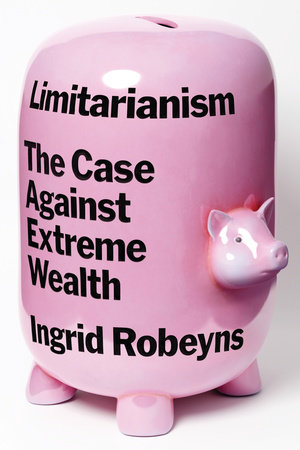Not that long ago, it would have been dangerous to denounce “extreme wealth,” as the Dutch scholar Ingrid Robeyns calls it in her new book, Limitarianism: The Case Against Extreme Wealth (Astra House; $28). But then along came the financial crisis of 2008, and the global Occupy movement that surfaced in 2011 and popularized the notion that one percent of the U.S. population controls most of the wealth—and that the 99 percent have been excluded from the American Dream. Soon, dozens of books, flooded the marketplace.
Joseph Stiglitz’s The Price of Inequality (2012), T.M. Scanlon’s Why Does Inequality Matter? (2008), Thomas Piketty’s Capital in the Twenty-First Century (2014), and Mike Savage’s The Return of Inequality (2021), among other books and articles, have altered conversations in and outside academia about wealth and power. Robeyns has read and thought deeply about the subject she tackles; her book builds on the facts and arguments presented in the vast body of literature that has sought to open the eyes of the public and amplify the cause of equality.
Limitarianism offers a genuine contribution to the conversation and ought to be read by egalitarians and their foes. But does the world need a new -ism to add to the long list: capitalism, communism, radicalism, egalitarianism? Robeyns thinks that “limitarianism” could be a rallying cry for the masses, though it doesn’t seem likely that the word will become a part of everyday conversations. Still, get behind the troublesome title of her book and into her ten lucid chapters—with titles like “How Much Is Too Much?,” “Nobody Deserves to be a Multimillionaire,” and “Philanthropy Is Not the Answer”—and the book makes a lot of sense.
Part manifesto, part sermon, and part critique of inequality, Limitarianism does not issue a Marxist call for revolution, but rather for social and political reforms. Robeyns isn’t against all wealth, just “extreme” wealth of the kind amassed by the billionaires she names: Elon Musk, Jeff Bezos, Bill Gates, and Bernard Arnault (the owner of Louis Vuitton, Christian Dior, and Tiffany). As she points out, today’s billionaires can be found all around the world; there are more of them now than ever before. According to Forbes, there were 2,668 billionaires in 2022; they held assets valued at $12.7 trillion. She crunches the numbers and figures they each earn about $41,000 every hour over the course of a lifetime.
If Robeyns wants structural reforms rather than a Marxist revolution, what does she actually mean? “We should strive to design our economies in such a way that we end up with an equitable distribution of wealth, and a decent standard of living for all,” she writes. “That means a larger share of the pie goes to the poor and less goes to those who are currently taking the most.”
Robeyns knows that’s an uphill battle. In 2023, in the Netherlands and Belgium, big media lined up as the foes of equality. Robeyns writes, “they began to attack implausible straw men versions of the proposal.” She wants real debate and an end to “caricature and ridicule.”
Limitarianism owes much of its persuasive power to the author’s cogent arguments, as well as her anecdotes. Bicycling in rural Netherlands with her eldest child, they both notice an unhoused man asleep on a bench. “Mom, did you see that?” the boy asks. He adds, “I’m ashamed that as a society we treat people this way.” Surely, Robeyns’s son and veterans of the Occupy movement will grasp the case Bobeyns makes in Limitarianism; perhaps the generations to which they belong will rally behind her and call for structural reforms. Perhaps, too, the old story of the rich getting richer and the poor getting poorer will have a less bleak and more inspirational ending.
Jonah Raskin is the author of, among other books, For the Hell of It: The Life and Times of Abbie Hoffman and Field Days: A Year of Farming, Eating and Drinking Wine in California.

